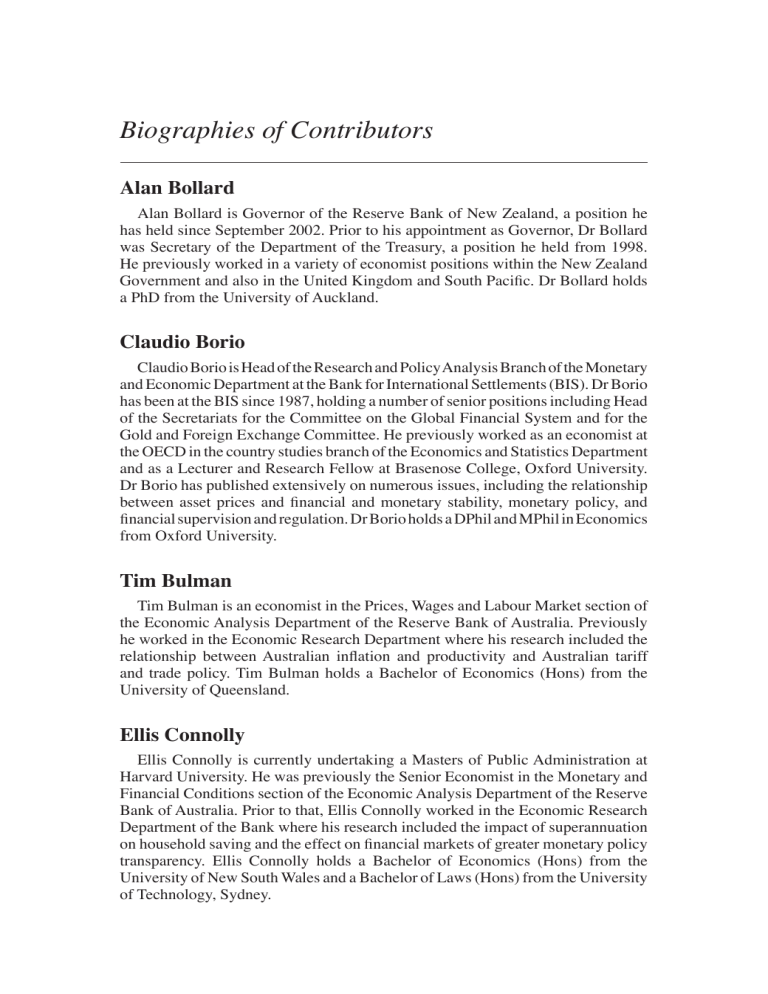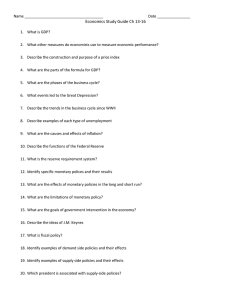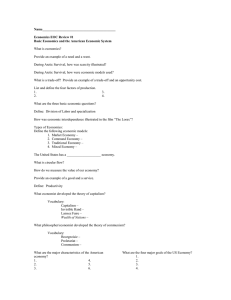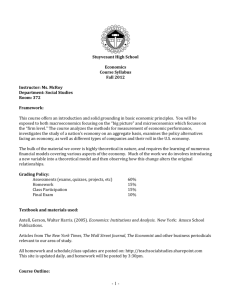Biographies of Contributors Alan Bollard

294 Biographies of Contributors
Biographies of Contributors
Alan Bollard
Alan Bollard is Governor of the Reserve Bank of New Zealand, a position he has held since September 2002. Prior to his appointment as Governor, Dr Bollard was Secretary of the Department of the Treasury, a position he held from 1998.
He previously worked in a variety of economist positions within the New Zealand
Government and also in the United Kingdom and South Paci fi c. Dr Bollard holds a PhD from the University of Auckland.
Claudio Borio
Claudio Borio is Head of the Research and Policy Analysis Branch of the Monetary and Economic Department at the Bank for International Settlements (BIS). Dr Borio has been at the BIS since 1987, holding a number of senior positions including Head of the Secretariats for the Committee on the Global Financial System and for the
Gold and Foreign Exchange Committee. He previously worked as an economist at the OECD in the country studies branch of the Economics and Statistics Department and as a Lecturer and Research Fellow at Brasenose College, Oxford University.
Dr Borio has published extensively on numerous issues, including the relationship between asset prices and fi nancial and monetary stability, monetary policy, and fi nancial supervision and regulation. Dr Borio holds a DPhil and MPhil in Economics from Oxford University.
Tim Bulman
Tim Bulman is an economist in the Prices, Wages and Labour Market section of the Economic Analysis Department of the Reserve Bank of Australia. Previously he worked in the Economic Research Department where his research included the relationship between Australian in fl ation and productivity and Australian tariff and trade policy. Tim Bulman holds a Bachelor of Economics (Hons) from the
University of Queensland.
Ellis Connolly
Ellis Connolly is currently undertaking a Masters of Public Administration at
Harvard University. He was previously the Senior Economist in the Monetary and
Financial Conditions section of the Economic Analysis Department of the Reserve
Bank of Australia. Prior to that, Ellis Connolly worked in the Economic Research
Department of the Bank where his research included the impact of superannuation on household saving and the effect on fi nancial markets of greater monetary policy transparency. Ellis Connolly holds a Bachelor of Economics (Hons) from the
University of New South Wales and a Bachelor of Laws (Hons) from the University of Technology, Sydney.
Biographies of Contributors 295
Gordon de Brouwer
Gordon de Brouwer is Principal Adviser (Macroeconomic) at the Australian
Department of the Treasury. He was previously Professor of Economics in the
Asia Paci fi c School of Economics and Government and Executive Director of the
Australia-Japan Research Centre at the Australian National University (ANU). His research has spanned economic developments in Australia, Japan and east Asia, as well as open economy macroeconomics and policy, monetary and fi nancial economics, and international relations. Dr de Brouwer ʼ s publications include Hedge funds in emerging markets (2001), Financial integration in east Asia (2003), and he is the contributing editor of Financial governance in east Asia (2003) and Financial markets and policies in east Asia (2001). He is co-author of Strengthening Australia-
Japan economic relations (2002), a major report written for the Department of
Foreign Affairs and Trade. Before joining the ANU in January 2000, Dr de Brouwer was Chief Manager, International Markets and Relations, at the Reserve Bank of
Australia. Dr de Brouwer holds a PhD from the ANU, and a Masters of Commerce from the University of Melbourne.
Pierre Duguay
Pierre Duguay is a Deputy Governor of the Bank of Canada, a position he has held since January 2000. Pierre Duguay has published on numerous topics, including the monetary transmission mechanism, the macroeconomic effects of fi scal policy, and macroeconomic modelling; he has been a member of Statistics Canada Price
Measurement Advisory Committee since 1999 and a member of Statistics Canada
National Accounts Advisory Committee from 1994 to 1999. Prior to his current appointment, Mr Duguay served in a number of senior positions with the Bank of
Canada, including Adviser to the Governor (1992–1999), Chief of the Research
Department (1991–1992), and Chief of the Department of Monetary and Financial
Analysis (1987–1991). Pierre Duguay has an MA in economics from the Université de Montréal.
Malcolm Edey
Malcolm Edey is Assistant Governor (Economic) at the Reserve Bank of Australia
(RBA), a position he has held since January 2002. Dr Edey has published on a variety of topics, including monetary policy, fi nancial markets, and saving and superannuation. He was the editor of the 1996 RBA conference volume The future of the fi nancial system . Prior to his current appointment Dr Edey was the Head of the
Domestic Markets (2001–2002), Economic Analysis (1997–2001) and Economic
Research (1995–1997) Departments at the Bank. Earlier he spent three years working in the Economics Department of the OECD in Paris, where he worked on monetary and fi nancial policy issues and the economic survey of Mexico. Dr Edey holds a
PhD from the London School of Economics.
296 Biographies of Contributors
John Edwards
John Edwards is Chief Economist for HSBC in Australia, a position he has held since early 1997. Between 1991 and 1994 Dr Edwards was Senior Adviser
(Economic) to Treasurer and then Prime Minister Paul Keating. After leaving the
Prime Minister ʼ s of fi ce he worked in banking roles, fi rst as an adviser at Macquarie
Bank and then as chief economist for Société Générale. Previously, Dr Edwards was an economic and political reporter in Canberra, Sydney and Washington. Dr Edwards holds a PhD from George Washington University.
Simon Guttmann
Simon Guttmann is an economist in the Research Department of the Reserve
Bank of Australia. His research has included an analysis of the determinants of country trade openness. Dr Guttmann holds a PhD from Monash University. A revised version of his thesis, The rise and fall of monetary targeting in Australia , will be published in 2004.
Alexandra Heath
Alex Heath is the Head of the Prices, Wages and Labour Market section of the
Economic Analysis Department of the Reserve Bank of Australia (RBA). Dr Heath has previously worked in a variety of roles in the Economic Group of the RBA.
Dr Heath has published on numerous topics, including macroeconomic model building, in fl ation and labour market issues. Dr Heath holds a PhD from the London
School of Economics.
Robert Hill
Robert Hill is an Associate Professor in the School of Economics at the University of New South Wales. He has published extensively in the fi elds of index number theory, the measurement of in fl ation and growth, comparisons of living standards across countries and environmental accounting. Professor Hill has previously held visiting positions at Washington University in St Louis, and the University of Groningen in the Netherlands. Professor Hill holds a PhD from the University of British Columbia, Vancouver. In 2001 he was awarded the Academy of Social
Sciences of Australia Medal.
Takatoshi Ito
Takatoshi Ito is a Professor in the Faculty of Economics and the Research Centre for Advanced Science and Technology at the University of Tokyo. Professor Ito has published extensively on the Japanese economy, monetary policy in Japan and east Asia and the Japan–US economic relationship in leading journals. Professor Ito was previously the Deputy Vice Minister for International Affairs in the Ministry of
Finance in Japan. He has also been a senior adviser at the Research Department of
Biographies of Contributors 297 the International Monetary Fund. Professor Ito has taught at a number of universities including Harvard University and the University of Minnesota. Professor Ito holds a PhD from Harvard University.
Christopher Kent
Christopher Kent is a Deputy Head of the Economic Analysis Department of the
Reserve Bank of Australia, a position he has held since September 2003. Prior to this, Dr Kent spent almost three years working in the European Department of the
International Monetary Fund. Dr Kent ʼ s earlier career was spent at the Bank, where he worked in Economic Group and System Stability Department. His research interests include the links between asset prices and monetary policy, in fl ation targeting for small open economies, and the relationship between the current account and the terms of trade. Dr Kent holds a PhD from the Massachusetts Institute of Technology.
Marion Kohler
Marion Kohler is a Senior Research Manager in the Economic Research
Department of the Reserve Bank of Australia. She has eclectic research interests and has previously published papers on a variety of topics, including monetary unions, exchange rates, and consumption and saving. Prior to joining the Reserve Bank in
2001, Dr Kohler spent several years at the Bank of England where she worked in different sections within the Monetary Analysis area. Dr Kohler holds a PhD from the European University Institute, Florence.
Kenneth Kuttner
Ken Kuttner is the Danforth-Lewis Professor of Economics at Oberlin College,
Ohio. Professor Kuttner has published extensively in leading journals on the role of monetary aggregates and interest rates in monetary policy, in fl ation targeting, and the reaction of fi nancial markets to unanticipated shifts in Federal Reserve policy. Professor Kuttner was previously Assistant Vice President in the Research
Departments of the Federal Reserve Banks of New York and Chicago. Professor
Kuttner has taught at a number of universities including Columbia University, the
University of Wisconsin and the University of Chicago. Professor Kuttner holds a
PhD from Harvard University.
Robert McCauley
Robert N McCauley currently serves as Deputy Chief Representative at the the Bank for International Settlements ʼ Representative Of fi ce for Asia and the
Paci fi c in Hong Kong. Recent work on Asia has included analyses of capital fl ows since the crisis, fi nancial integration, bond markets, foreign exchange markets, monetary policy, foreign currency deposits, and foreign banks ʼ domestic currency lending. He co-edited BIS Paper 15, China ʼ s capital account liberalisation:
298 Biographies of Contributors international perspectives, based on a joint BIS-SAFE seminar. After joining the
BIS in October 1994, he analysed fi xed income and foreign exchange markets, and authored a BIS monograph on bond market volatility. He also published several works questioning the consensus that the euro would appreciate from its inception, including the Princeton Essay, The euro and the dollar . Before joining the BIS, he worked for 13 years for the Federal Reserve Bank of New York, serving at times as chief economist for the interagency committee of bank supervisors that rates country risk. There he wrote on international comparisons of the cost of capital, foreign bank lending to US corporations and the unpro fi tability of foreign direct investment in the US. In 1992 he taught international fi nance and the multinational fi rm at the University of Chicago ʼ s Graduate School of Business. In 1999, MIT Press published his co-authored book, Dodging bullets: changing US corporate capital structures in the 1980s and 1990s .
Warwick McKibbin
Warwick McKibbin is Professor of International Economics in the Research School of Paci fi c and Asian Studies and Director of the Centre for Applied Macroeconomic
Analysis at the Australian National University. He is also a Professorial Fellow,
The Lowy Institute for International Policy, a non-resident Senior Fellow at the
Brookings Institution in Washington DC and a Board member of the Reserve Bank of
Australia. He is a Fellow of the Australian Academy of Social Sciences and a founding member of the Harvard University Asian Economic Panel. Professor McKibbin ʼ s research interests are diverse, including macroeconomic policy, international trade and fi nance, macroeconomic modelling and greenhouse policy issues. He has published widely, including Global linkages: macroeconomic interdependence and cooperation in the world economy (1994, co-authored with Jeffrey Sachs) and
Climate change after Kyoko: a blueprint for a realistic approach (2002, co-authored with Peter Wilcoxen). Professor McKibbin spent 16 years at the Reserve Bank and has been a visiting scholar at the Japanese Ministry of Finance and United States
Congressional Budget Of fi ce. He has consulted widely for international agencies including the United Nations and the World Bank, as well as for numerous national governments. Professor McKibbin holds a Masters and a PhD in Economics, both from Harvard University.
Frederic Mishkin
Frederic Mishkin is the Alfred Lerner Professor of Banking and Financial
Institutions at the Graduate School of Business at Columbia University, a Research
Associate of the National Bureau of Economic Research, a Senior Fellow at the
Federal Deposit Insurance Corporation Center for Banking Research and the
President-Elect of the Eastern Economic Association. Professor Mishkin has published extensively on monetary policy and its impact on fi nancial markets and the aggregate economy in leading journals and is the author of more than ten books.
Prior to his current appointment, he was Executive Vice President and Director of
Research at the Federal Reserve Bank of New York and an associate economist
Biographies of Contributors 299 to the Federal Open Market Committee of the Federal Reserve System. Professor
Mishkin has taught at a number of universities, including Chicago, Northwestern,
Princeton and Columbia. Professor Mishkin holds a PhD from the Massachusetts
Institute of Technology.
Stefan Palmqvist
Stefan Palmqvist is the Head of the Applied Research Division at the Monetary
Policy Department at Sveriges Riksbank (Central Bank of Sweden). Dr Palmqvist has published on the formation of household ʼ s in fl ation expectations, the relationship between mark-ups and in fl ation, and the measurement of in fl ation. Dr Palmqvist is also a member of Statistics Sweden ʼ s CPI committee. Dr Palmqvist holds a PhD from the University of California at Berkeley.
Ivan Roberts
Ivan Roberts is an economist in the Prices, Wages and Labour Market section of the Economic Analysis Department of the Reserve Bank of Australia. Previously he worked in the Economic Research Department where his research included a study on the determinants of business and consumer sentiment. Ivan Roberts holds a Bachelor of Economics (Hons) from the Australian National University.
Glenn Stevens
Glenn Stevens was appointed Deputy Governor of the Reserve Bank of Australia in December 2001. He has spent most of his professional career in the Reserve
Bank, joining the Research Department in 1980. He held various senior positions in the 1990s, and from 1996 to 2001, was Assistant Governor (Economic). He holds degrees in Economics from the University of Sydney, and the University of
Western Ontario, Canada. In 1990, he was a visiting scholar at the Federal Reserve
Bank of San Francisco. He is also a member of Advisory Boards for the Hong Kong
Institute for Monetary Research, and the Melbourne Institute of Applied Economic and Social Research at the University of Melbourne.
Andrew Stone
Andrew Stone is a Senior Research Manager in the Economic Research Department of the Reserve Bank of Australia, where he has worked since January 2001. Prior to that he spent just over fi ve years at the Australian Department of the Treasury, after returning to Australia from the US, where he worked for a year as a Visiting
Assistant Professor in the Mathematics Department of the University of California at Irvine. Dr Stone has published articles in a number of mathematics journals, as well as in the Bank ʼ s Research Discussion Paper series. Dr Stone holds a PhD in
Pure Mathematics from Stanford University, and a Graduate Diploma in Economics from the Australian National University.
300 Biographies of Contributors
John Williams
John Williams is a Senior Vice President and Advisor in the Economic Research
Department of the Federal Reserve Bank of San Francisco. Dr Williams has published articles on numerous topics including the implications of a low-in fl ation environment for monetary policy, monetary policy rules, in fl ation expectations, business cycles, and long-run growth. Prior to his current appointment, Dr Williams served as a
Senior Economist at the Council of Economic Advisers and as a Senior Economist at the Board of Governors of the Federal Reserve System, where he was active in developing the staff ʼ s large-scale macroeconometric model, FRB/US. Dr Williams holds a Master ʼ s degree in economics from the London School of Economics and a PhD in economics from Stanford University.





